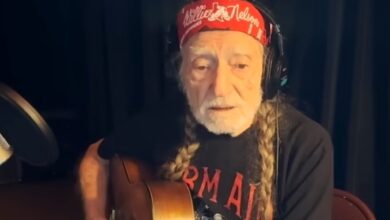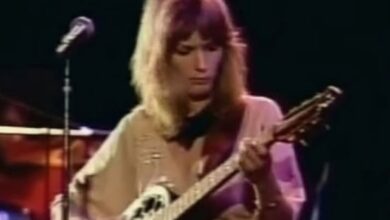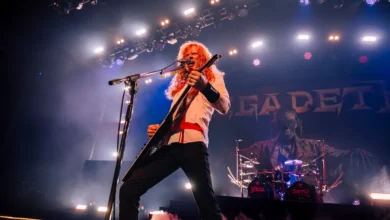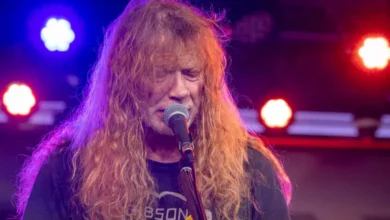Heart Reignite the Fire with a Spellbinding “Magic Man” Performance Live on The Howard Stern Show
On an April Wednesday that already felt like a mini–rock festival inside a radio studio, the Howard Stern Show control room lit up with the kind of anticipation usually reserved for arena encores. Heart were in the building, not just to talk, but to plug in and play “Magic Man” live, decades after the song first rewired FM radio. The visit was timed to the launch of their Royal Flush Tour 2024, the band’s first full-scale road run in five years, which meant the performance doubled as both a nostalgia trip and a mission statement: Heart were back, and they were coming out swinging with one of their most dangerous early hits.
Before anyone hit a note, Howard did what he does best and turned the studio into a confessional. Ann and Nancy Wilson sat across from him, headphones on, talking about how their story started not in platinum boardrooms but in a constantly moving military family where music was the only fixed address. They described themselves as “little military brats” who believed they could be their own version of the Beatles, and there was a mischievous pride in the way Nancy recalled that youthful delusion that turned out not to be a delusion at all. By the time they got to their debut album Dreamboat Annie, you could feel the room recognizing that this was not just another guest spot but a living chapter of rock history sitting on the couch.
The conversation quickly detoured into origin myths that now sound like scenes from a music biopic. The sisters laughed about getting fired from a club in Alberta after Ann made a crack about the food, only to wake up the very next day with an offer to open for Rod Stewart in Montreal. They remembered walking onstage, leading with “Magic Man,” and watching a sea of lighters rise in the dark, shocked that people so far from home already knew their song by heart. That Montreal moment, born out of what could have been a career setback, was essentially the Big Bang of Heart’s ascent, the night “Magic Man” stopped being just a track on a local label and became a passport to the world.
Howard, sensing the emotional thread, zeroed in on “Magic Man” itself. He asked what everyone has wondered for years: was the “magic” in the title really about the guy’s bedroom prowess, or something bigger? Ann smiled and didn’t exactly deny it, then walked listeners through the real story behind the song. It was rooted in her relationship with then–boyfriend and band manager Michael Fisher, who had moved to Canada during the Vietnam era, and in a deeply uncomfortable confrontation with her mother about following him north. That clash between desire and disapproval became the backbone of the lyrics, turning a personal leap of faith into a universal story about leaving home for love.
That backstory gave the upcoming performance a charge you could almost hear through the radio. When the interview break ended and the studio techs shifted into performance mode, the atmosphere changed from talk show to club gig. Nancy adjusted the strap on her guitar, the band settled into position, and the Stern Show crew went quiet in that reverent way people do when they know they’re about to witness something special. Howard gave a quick, almost boyish introduction, reminding listeners that this was the same “Magic Man” that first broke Heart on the airwaves nearly half a century ago, and then stepped back, letting the Wilson sisters do what they came to do.
The opening riff of “Magic Man” is one of those guitar lines that instantly changes the temperature of a room, and even in the controlled environment of a SiriusXM studio it hit like a blast of humid club air from 1976. Nancy’s guitar tone struck a balance between vintage and modern, still drenched in that slightly mysterious shimmer but with the clarity of today’s high-end live rigs. Without the cavernous reverb of an arena to hide in, every note felt up-close and magnified, and the groove locked in tight as the rhythm players dug into that slow, stalking pulse that makes the song feel like a spell being cast in real time.
Then Ann opened her mouth, and the whole reason this performance went viral became obvious. Her voice did not arrive as a polite, museum-piece rendering of a classic; it came in hot, muscular and elastic, with the same wide vibrato and fierce attack that stunned audiences in the seventies. What changed was the emotional shading. You could hear years of experience in the way she leaned on certain words, stretching a syllable here, biting down on another there, as if she were revisiting the younger woman in the song and giving her a knowing nod from the far side of life. It was a masterclass in how to age with a song instead of trying to outrun your past self.
Part of the magic of the Stern Show version was how intimate the arrangement felt while still packing the weight of an arena performance. The original studio cut of “Magic Man” is famous for its extended instrumental break, with that swirling Minimoog and long guitar solo, but in the radio studio they tightened the structure without losing the drama. The band let the tension rise in subtler ways—tiny dynamic swells, tasteful fills, the way Nancy’s backing vocal lines slipped like ghost echoes behind Ann’s lead. Instead of cinematic synth clouds, you got the raw electricity of strings, fingers, and breath, and that stripped-back clarity made the song’s bones look even stronger.
Even through speakers, you could sense the physical closeness of the players. Nancy watched Ann like a hawk, adjusting her strumming pattern or accenting a chord when the vocal phrasing pushed into a new emotional gear. The band responded in kind, tightening around her like a net, catching every held note and dramatic pause. That kind of telepathy does not come from rehearsal alone; it comes from thousands of nights on the road, from the strange sibling alchemy that lets one sister finish the other’s musical sentences without a word. In the compressed, camera-filled Stern studio, that connection read almost like a documentary on how a band breathes together.
As “Magic Man” moved into its instrumental section, the performance became a sort of time machine. The song itself is frozen in the mid-seventies, all witchy seduction and analog warmth, but the way Heart delivered it here felt firmly anchored in 2024. Guitar tones were cleaner, the low end more defined, and yet the spirit was identical: a young woman stepping into her own power, choosing desire over safety. Knowing now that the lyrics were sparked by Ann’s decision to follow her boyfriend across a border, against her mother’s wishes, made every line about leaving home and chasing something intangible land with extra force. It was less a trip down memory lane than a reminder that those rebellious choices still echo in the present.
When the last note of “Magic Man” rang out, there was that beautiful half-second of stunned silence you only get after a performance that really connects. Howard and Robin broke it with an almost giddy rush of praise, but instead of basking in it for long, the band turned the page and changed the mood entirely with their next song: a hushed, acoustic take on Led Zeppelin’s “Going to California.” It was a clever bit of programming—pairing their own breakthrough single with a song by their heroes—and it framed “Magic Man” as part of a much larger tapestry of ’70s rock that Heart have both absorbed and helped to shape.
Their conversation about “Going to California” was itself a highlight. Ann pointed out how deceptively demanding an acoustic tune can be, noting that songs like this require more discipline, not less, precisely because there’s no wall of distortion to hide behind. Nancy talked about the Celtic, wide-open feeling of the piece, likening it to standing on some windswept moor, which is exactly the kind of poetic shorthand that makes sense the moment you hear her play it. Coming right after the simmering heat of “Magic Man,” the Zeppelin cover acted like a cool night breeze, showing another side of the same band and underlining just how broad their musical reach really is.
Of course, Heart were never going to leave the Stern studio without unleashing “Barracuda,” and closing with that snarling riff created a satisfying three-act story: personal myth with “Magic Man,” reverent homage with “Going to California,” and righteous fury with their classic takedown of industry sexism. Ann reminded Howard that “Barracuda” was sparked by a sleazy music-business figure implying that the sisters were more than just bandmates, and Nancy described how the riff became the perfect vehicle for Ann’s anger. Hearing that history, then immediately hearing the song explode into life just a few feet from Howard’s desk, made the whole set feel like a compressed biography in three tracks.
One of the most moving moments of the whole episode didn’t involve a song at all, but Robin Quivers trying not to cry as she told the Wilson sisters what they had meant to her. She spoke as a lifelong rock fan who had spent years searching for women’s voices in a landscape dominated by men, and described hearing Heart’s debut as a kind of revelation: finally, someone was singing rock from a woman’s point of view without compromise. Her gratitude poured out in real time, and you could hear Ann and Nancy absorbing it with the slightly stunned humility of people who spent their youth just trying to be a band and now find themselves woven into other people’s life stories.
That exchange underlined how unusual Heart’s career really is. Here were Rock and Roll Hall of Famers who had turned a debut album like Dreamboat Annie into a double-platinum calling card, stacked up 20 Top 40 singles, sold more than 35 million albums, and still somehow felt slightly underrated compared to the male acts they once opened for. Listening to “Magic Man” erupt in real time inside the Stern studio, you could hear exactly why they’ve endured: the blend of hard-rock muscle and emotional nuance, the refusal to sand down the edges to fit trends, and the simple fact that Ann and Nancy are still, after all these years, writing the rulebook for women in rock rather than just following one.
Outside the studio, the performance took on a life of its own. Clips of “Magic Man” from the Stern Show quickly circulated online, shared by classic-rock fans rediscovering their youth and younger listeners encountering the song for the first time in a stripped-down, modern context. On social platforms and comment sections, people traded stories about seeing Heart in the seventies, eighties, or just last summer, or about how their parents’ vinyl copy of Dreamboat Annie had soundtracked whole childhoods. One Reddit user even called a different live “Magic Man” show with the Wilsons and Jason Bonham the greatest performance of a song they’d ever seen, a sentiment that easily could have been applied to this studio take by anyone who stumbled onto it cold.
In the end, what made “Magic Man” live on the Stern Show so special wasn’t just technical perfection or nostalgic glow, though it had plenty of both. It was the feeling of watching a band revisit its own origin story with full awareness of everything that’s happened since—the tours, the lineup changes, the tributes, the Hall of Fame, the quiet stretches and triumphant returns—and still play that breakout song like the decision at its core is happening right now. In a small satellite-radio studio in 2024, Heart once again told the world that sometimes you follow the magic, no matter who disapproves, and that if you do it with enough conviction, people will still be listening, awestruck, almost fifty years later.





